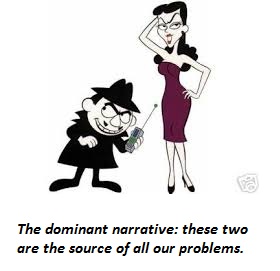6 Key Questions about RussiaGate
The claims that Russia meddled in the 2016 U.S. election are now known as RussiaGate, in a loose reference to the Watergate scandal of the early 1970s.
In the U.S., the issue has been poisoned by profound partisanship: those who feel disenfranchised by the election of Donald Trump are trying to use RussiaGate to unseat or cripple the Trump presidency, while those who elected Trump feel RussiaGate is nothing but an attempt by the corrupt status quo to disenfranchise them.
Let’s see if we can clarify the issues with some key questions.
1. Did Russia meddle in the 2016 U.S. election? This is the entire thing in a nutshell. But this raises a second question: did Russia successfully meddle in the 2016 U.S. election? In other words, we have two investigations: one to identify verifiable, legally actionable evidence of meddling, and a second investigation into the effects of any meddling–should evidence arise that would stand up in court.
2. What federal laws or statutes were broken? This is a serious charge, and the first step in any investigation is to nail down precisely what federal laws were broken? The next step is to assemble evidence for the criminal activity that will stand up in court.
3. What standard of evidence/proof is required in a federal court to convict the accused? Is intent a necessary component of the laws that were broken? Whatprecisely constitutes burden of proof? It isn’t enough to accuse persons unknown of wrong-doing: the precise laws that were broken must be identified and the case against specific individuals must be built on verifiable evidence that will stand up in federal court.
Recall that this is not about partisan talking points–it’s about justice. Those who reckon justice counts for nothing in this investigation disqualify themselves. If justice no longer matters in America, there is no America left to defend.
4. If incontrovertible evidence of Russian meddling arose in 2016, why did the federal agencies under the Obama administration (Department of Justice, F.B.I., etc.) do nothing? While we can cook up various theories, the common-sense conclusion is 1. no federal laws were broken and/or 2) there was insufficient evidence that would stand up in court.
5. Precisely what meddling occurred? Somebody meeting with a Russian does not constitute proof of anything. rather, this is the classic witch-hunt accusation of the McCarthyite “Red Scare” of the 1950s–guilt by association: you were seen conversing with a Communist, thus you must also be a Communist–or at a minimum, you are tainted by association and thus under a cloud of suspicion that can never be cleared because no accusation of guilt in a court of law is ever made.
Guilt by association is insidious because it can’t be cleared in court. Those accused of guilt by association are not innocent until proven guilty–they are guilty until proven innocent, a proof that can never satisfy the accusers.
A precisely defined chain of verifiable actions is required to prove meddling beyond reasonable doubt. So date, all the accusations have failed to meet this most fundamental standard of evidence of wrong-doing.
As for the claim that “all 17 U.S. intelligence agencies concur that blah-blah blah”– Where precisely is the evidence? If there is no verifiable evidence and no chain of events that can be substantiated with hard evidence that will stand up in federal court, then all we really have is accusations of guilt by association, i.e. a witch-hunt.
6. What evidence supports the claim that Russian meddling actually influenced the election? The claim that Russians hacked the Democratic National Committee emails has fallen apart for lack of evidence; it now seems clear that the hack was an inside-the-DNC whistleblowing incident.
As for the claim that Russian meddling negatively impacted the campaign of Hillary Clinton: the most damaging bits were all verifiably accurate in the public record:
— The Podesta emails were in fact Podesta emails.
— The video of candidate Clinton apparently collapsing on the curb was not fabricated; it was a video recorded by an amateur bystander.
— Reports of pay-to-play and other unsavory activities within the Clinton Foundation predate the election by years.
— Candidate Clinton’s comments on “deplorables” were her own words.
Again, standards of evidence and proof of guilt of federal crimes require a precise chain of events and actions for which there is evidence that will stand up in federal court, , i.e. evidence that will persuade a jury or federal judge and that can withstand cross-examination and the inquiries of experts hired by the defense.
Given the absolute paucity of actionable, verifiable evidence to date, RussiaGate is so far nothing but a series of unsupported accusations of guilt by association, i.e. a witch-hunt. This is why some in the mainstream media have characterized the whole thing as a “nothing-burger.”

Compare RussiaGate to Watergate. Watergate was always about compiling evidence of activities that violated federal laws. People who broke federal laws were identified, evidence was compiled and presented in a court of law where the accused were able to defend themselves against an indictment presented by federal prosecutors. Some were acquitted, many were convicted, others plea-bargained a conviction with a reduced sentence.
Those making accusations in RussiaGate must now put up or shut up: either present the evidence that supports federal indictments, or confess to the pursuit of a witch hunt, i.e. unsubstantiated accusations of guilt by association. Anything less than the presentation of actionable evidence that leads to indictments and convictions is not justice–it’s just another witch-hunt that besmirches everyone who participates in the witch-hunt.
If you found value in this content, please join me in seeking solutions by becoming a $1/month patron of my work via patreon.com.
Leave a Reply